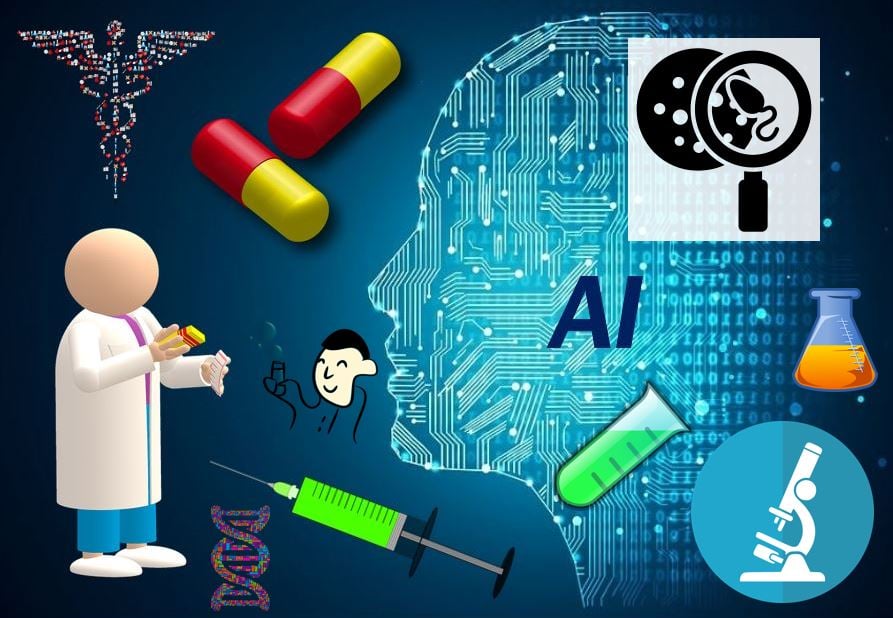Artificial intelligence (AI) has become an integral part of everyday life. It improves the quality of the photos you take with your smartphone; it helps you write your emails and texts; and it makes personalised content recommendations.

Several industries including the healthcare sector have also made big advancements thanks to AI technology. But what exactly is Artificial Intelligence? How is it used in the medical field, particularly for research? And what can we expect from it in the future?
What is Artificial Intelligence?
Artificial Intelligence is a branch of computer science that deals with developing and creating systems and machines that mimic the way we think and learn. In short, AI’s goal is to replicate human thought processes to execute tasks faster, more efficiently, and more accurately.
AI systems can range from fulfilling simple tasks such as collecting, organizing, and structuring data to more complicated functions such as solving high-level equations and complex problems.
Artificial intelligence is composed of different branches, including Deep Learning and Machine Learning. Machine learning enables a system to learn and progress over time by feeding it new data and techniques. While the system or machine gets better over time through Machine Learning, it still requires some degree of human supervision.
Deep Learning on the other hand, is a more advanced and complex subset of Machine Learning. Deep Learning employs a structure of complex neural networks. The neural network acts as the machine’s brain, using algorithms to make intelligent decisions, conclusions, and predictions without human involvement.
Use of Artificial Intelligence in Medical Research
Artificial Intelligence has revolutionized the medical industry. In medical research, the primary application of Artificial Intelligence is to compile, summarize, and analyze large sets of data, faster and more precisely than traditional methods, in order to understand trends and to make better predictions about the future.
Traditional methods of medical research often include extensive research and analysis of scientific literature. To help with this, AI-powered article summarizer tools for researchers can be extremely useful in quickly identifying key facts and generating direct links to cited sources, saving hundreds of hours.
By using these tools on a large collection of literature, data can be collated and analyzed more easily, and essential information about study participants, methods, main findings, conclusions and limitations can be absorbed more quickly. With the help of AI, medical researchers can examine hundreds of scientific papers in a relatively short period of time.
Likewise, medical institutions, doctors, and scientists use AI to store and analyze patients’ medical records more efficiently. Hospitals aim to provide better patient care by turning unstructured medical notes into a structured database with the help of AI. Several tech giants such as Google and IBM are developing systems to aid clinicians. These systems can detect patterns within patient data, speeding up diagnosis and treatment.
Artificial Intelligence can also provide precision medicine. Precision or personalized medicine aims to provide tailored treatment to a patient or a group of individuals. Healthcare AI can identify patients’ traits, genetics, and environmental factors at a very granular level which can be used to aid doctors and medical professionals in formulating and designing better treatment plans.
Similarly, Artificial Intelligence has a significant impact on drug development research and clinical testing. It aims to significantly shorten the research process, thereby reducing the cost and improving the chances of success.
AI can help researchers, for example, to identify and understand the best proteins and compounds for disease treatment. It also speeds up clinical testing phases by systematically identifying the most suitable candidates for trials.
Future of AI in Healthcare
The development and improvement of Artificial intelligence shows no indication of slowing down. According to a report by PwC, AI can potentially contribute $15T (£10.5T) to the total global economy and boost local GDPs by about 26% by 20301. Today, both multi-million companies and small startups are increasingly contributing significant investments in the field of AI.
Artificial Intelligence is continuously making significant contributions to the development and improvement of healthcare. And there’s still a lot of potential for further improvements. In future, new systems that can perform basic and complex tasks will be more widespread in the medical sector.
There will be more technologies driven by AI that can help researchers formulate solutions and make breakthroughs. Better control and understanding of big data, and more efficient and cost-effective ways of handling data are just some of the future goals of AI.
Many fear that AI will replace humans, taking away jobs in the health sector. While it can replace basic work tasks, such as data processing, it poses no initial threat to professionals. Doctors and medical experts agree that AI is still a long way off making decisions where empathy and reasoning are necessary. The hope is that AI technology can work hand in hand with the medical industry to improve research outcomes and deliver better patient care.
Related resources worth reading: Data Science and Machine Learning in the Medical Industry
Interesting related article: “What is machine learning?“

